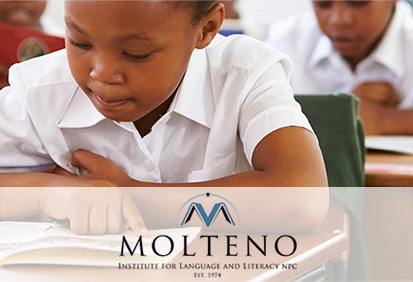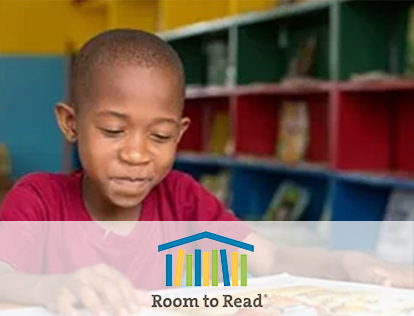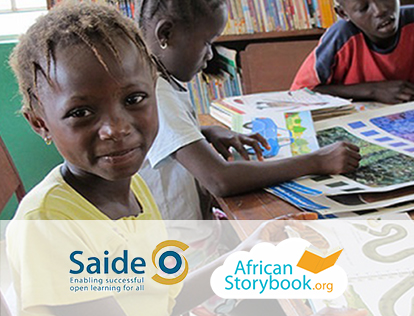Meet our Project Partners
Molteno Institute for Language and Literacies NPC
Molteno is an independent, national non-profit organisation dedicated to improving language and literacy in South Africa. Since its inception in 1974, Molteno has achieved a proud track record of developing language and literacy learning and teaching materials in the nine official African languages, as well as in English as a first additional language. As a service provider to the Department of Basic Education, Molteno has implemented numerous research-based programmes, such as EGRS, RSP and EGRP, to drive professional development in early grade reading, and providing training, coaching and instructional leadership in primary schools. Molteno has also extended its work into the ECD sector.
Molteno is well known for its original flagship programmes, Breakthrough to Literacy (BTL) and Bridge to English (BTE). More recently, Molteno has achieved national acclaim for its pioneering Vula Bula graded reader series, developed using a unique synthetic phonics approach to teaching reading in African languages in the Foundation Phase.
Molteno develops online content that is freely licensed. We provide research and evidence-based programmes that demonstrate key components of early literacy. Our specialties lie in the following disciplines:
- African language literacy
- English First Additional Language (EFAL)
- Materials development
- Training and coaching
- Research


NMI
The Nelson Mandela Institute for Education and Rural Development (NMI) focuses on improving the quality of primary schooling for rural children. Working to ensure that all children learn to read and write with meaning in the primary phase of learning, building a strong literacy culture within schools and communities, and empowering parents to support their children’s educational success.
In 2007 NMI, together with UNICEF launched the Bilingual Interactive Differentiated Classrooms programme in the Eastern Cape in 2007. Also known as the Magic Classroom Collective, the underlying premise of this initiative is that teaching should be engaging, diverse and fully grounded in its local context. In the case of the Eastern Cape, this means promoting learning in isiXhosa, the majority language in the province. Through the programme NMI brings together rural foundation phase teachers, teacher educators and researchers into a long-term working partnership.
Visit website
Room to Read
Room to Read started working in South Africa in 2006 and has since built impactful relationships with local communities, schools, and government. Room to Read South Africa operates in three provinces: KwaZulu-Natal, Mpumalanga, and Limpopo. It is the only organisation in the country offering both classroom instruction and a library programme.
The organisation combines the science of learning to read with the magic of reading for pleasure, developing a generation of independent readers who can break the cycle of illiteracy within their own families. Room to Read’s Literacy Programme enables students to become lifelong, independent readers (e.g., children who possess both literacy skills and a habit of reading) through:
- Establishing school libraries as safe and child-friendly spaces,
- Providing high quality learner books and teacher guides in local languages, and children’s library books in local languages and in English,
- Training and coaching teachers and librarians to be able to teach and nurture reading and writing skills, and
- Engaging with family, community members and the Department of Basic Education to ensure long-term sustainability of the project by encouraging ownership.

Saide
The African Storybook launched in 2014, is an initiative of Saide, a registered Non-Profit Organisation governed by a trust and based in Johannesburg. The African Storybook website has thousands of openly licensed free picture storybooks in the languages of Africa for children’s literacy, enjoyment and imagination. It also has tools for the translation, adaptation and creation of picture storybooks for children aged two to ten (early childhood and first three years of primary school).
African Storybook are pioneers in increasing the recognition of the usefulness of open license digital publishing to address early literacy challenges in sub-Saharan Africa. Ulwazi Lwethu is multifaceted and required us to produce an abundant variety of high-quality readers in African languages but to also build a supply of skilled Black writers, illustrators, proof-readers and editors of children’s materials in African languages.
The role of African Storybook was to manage the development and production of 73 picture storybook titles for Foundation Phase between 2020-2022. African Storybook produced both fiction and non-fiction storybook development for leisure readers in African languages.
Visit website



